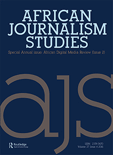
African Journalism Studies
Scope & Guideline
Advancing the discourse of journalism across Africa.
Introduction
Aims and Scopes
- Media Representation and Social Justice:
The journal explores how media representations affect marginalized communities and social justice issues, emphasizing the role of journalism in advocating for equity and justice. - Digital and Indigenous Media Practices:
It examines the intersection of digital technologies and traditional media, particularly how indigenous languages and local contexts shape journalism practices and audience engagement. - Crisis Reporting and Misinformation:
The focus includes the challenges and strategies of reporting during crises (e.g., health pandemics, political unrest), with a particular emphasis on misinformation and fact-checking. - Journalism Education and Training:
Analysis of journalism education practices in Africa, looking at how training adapts to the evolving media landscape and the preparation of students for a rapidly changing industry. - Political Economy of Media:
Investigates the relationships between media practices and political dynamics, including issues of censorship, regulation, and the influence of political actors on media narratives.
Trending and Emerging
- Misinformation and Media Literacy:
There is a growing emphasis on studying misinformation and media literacy, especially in relation to the COVID-19 pandemic, as journalists and audiences navigate the complexities of digital news consumption. - Environmental Journalism:
An emerging focus on environmental issues and climate justice highlights the importance of media in shaping narratives around ecological crises, particularly in the context of African nations. - Community Journalism and Citizen Engagement:
Research increasingly explores the role of community journalism and citizen engagement, emphasizing grassroots journalism practices and their impact on local narratives. - Digital Transformation and Journalism:
The impact of digital transformation on journalism practices is being extensively studied, revealing how technology reshapes news production and consumption in African contexts. - Decolonial Perspectives in Journalism:
There is a rising interest in decolonial approaches to journalism, examining how historical legacies influence contemporary media practices and advocating for more inclusive narratives.
Declining or Waning
- Traditional Media Critique:
There has been a noticeable decline in the focus on traditional media critiques, possibly overshadowed by the rise of digital platforms and the need to address newer forms of media engagement. - Historical Journalism Analysis:
Research centered on the historical analysis of journalism practices appears to be waning, as contemporary issues and immediate challenges take precedence over historical investigations. - Ethics in Journalism:
Discussions surrounding ethical journalism practices, while still relevant, have seen a reduction in frequency, suggesting a shift towards more pressing contemporary issues such as digital misinformation. - Global Comparisons of Journalism Models:
The comparative studies of African journalism with global models have decreased, indicating a more localized focus on African contexts rather than drawing parallels with global trends. - Cultural Studies of Journalism:
The intersection of cultural studies and journalism has seen a decline, as the journal increasingly prioritizes empirical and practice-oriented research over theoretical cultural critiques.
Similar Journals
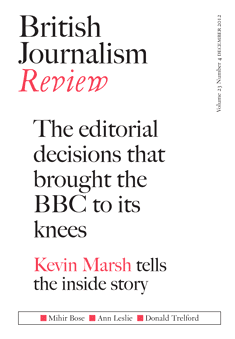
British Journalism Review
Illuminating Key Issues in Modern JournalismBritish Journalism Review is a distinguished academic journal dedicated to the exploration and analysis of the rapidly evolving field of journalism. Published by SAGE Publications Ltd, this journal plays a critical role in disseminating high-quality research that addresses key issues facing journalists and media organizations today. With an ISSN of 0956-4748 and an E-ISSN of 1741-2668, it is a pivotal resource for scholars, practitioners, and students alike. Although the journal does not currently offer Open Access options, it maintains a strong commitment to academic rigor and innovation in journalism studies. By engaging with a diverse range of topics such as media ethics, the impact of digital technologies, and the changing landscape of news consumption, the British Journalism Review remains instrumental in shaping contemporary debates and enhancing the scholarly discourse in its field.

Connectist-Istanbul University Journal of Communication Sciences
Unlocking Insights for a Connected WorldConnectist-Istanbul University Journal of Communication Sciences is a distinguished academic publication under the auspices of Istanbul University, Faculty of Communication, dedicated to advancing the field of communication studies. Since its inception, this Open Access journal has facilitated the dissemination of groundbreaking research and innovative methodologies, particularly since it embraced an open access model in 2017, promoting wider accessibility and engagement. As a pivotal resource for researchers, practitioners, and students alike, Connectist fosters interdisciplinary dialogue, exploring contemporary issues in communication, media studies, and related disciplines. With a commitment to rigorous peer review and scholarly excellence, the journal serves as an essential platform for cutting-edge insights and developments in communication sciences, thereby contributing significantly to the academic community and beyond.

Central European Journal of Communication
Advancing Research and Practice in CommunicationCentral European Journal of Communication, published by the Polish Communication Association, is a pivotal resource in the field of communication studies. Since its inception, this journal has become a significant platform for scholarly discourse, contributing valuable research and insights that span the diverse landscape of communication. With its current classification in the Q3 quartile of the communication category and a ranking of #315 out of 511 in Scopus, it is positioned to foster growth in communication research and practice within Central Europe and beyond. The journal invites submissions that explore a wide array of topics pertinent to communication, ensuring a robust dialogue among researchers, professionals, and students alike. Although currently operating under traditional access formats, the journal aims to enhance visibility and engagement by prioritizing quality content that addresses contemporary issues in communication, making it an essential resource for those looking to deepen their understanding of this dynamic field.
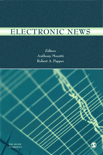
Electronic News
Unveiling Insights in the Evolving Landscape of News Media.Electronic News, published by SAGE PUBLICATIONS INC, stands at the forefront of scholarly communication, focused on the dynamic intersection of media, technology, and society. With an ISSN of 1931-2431 and an E-ISSN of 1931-244X, this journal has established itself as a valuable resource for academics and professionals alike, exploring critical themes in communication and information systems. Operating from its base in the United States, Electronic News operates within a competitive landscape, boasting a commendable Q2 ranking in Communication and a Q3 ranking in Information Systems. This reflects its commitment to high-quality research and impactful insights, as evidenced by its Scopus rankings, where it ranks #238 out of 511 in Social Sciences Communication and #302 out of 394 in Computer Science Information Systems. Although currently embracing a traditional subscription model, the journal serves as a crucial platform for disseminating knowledge that shapes the future of news and media in a rapidly evolving digital age. As it converges from 2009 to 2024, Electronic News continues to invite contributions that address the multifaceted challenges and innovations of news media, making it an essential resource for researchers, practitioners, and students eager to engage with contemporary issues in communication.

Journal of African Media Studies
Illuminating the African Media Landscape.Journal of African Media Studies, published by INTELLECT LTD, stands at the forefront of communication research, focusing on the rich tapestry of media practices and theories across the African continent. Since its inception in 2011, this peer-reviewed journal has dedicated itself to exploring the intricate relationships between media, culture, and society in Africa, contributing significantly to the global discourse on communication. With an impressive impact factor positioning it in Q2 of the Communication category for 2023, and ranking #218 out of 511 in the Scopus Social Sciences Communication field, it offers a rigorous platform for scholars and practitioners alike. The journal's commitment to quality research is evident in its robust editorial process and its regular publication of articles that delve into contemporary issues affecting African media landscapes. Despite being a subscription-based journal, it attracts an engaged readership interested in accessing critical insights and advancing knowledge in media studies. As it converges its timeline towards 2024, Journal of African Media Studies continues to be an essential resource for researchers, professionals, and students eager to contribute to and explore the evolving narratives of African media.
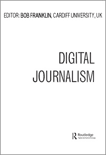
Digital Journalism
Unveiling Contemporary Challenges in the Digital News LandscapeDigital Journalism is an esteemed academic journal dedicated to advancing the interdisciplinary field of digital communication and journalism. Published by Routledge Journals, Taylor & Francis Ltd, this journal has established itself as a leading resource with a noteworthy Q1 rank in Communication for 2023, placing it among the top tier of journals in this dynamic field. With its ISSN 2167-0811 and E-ISSN 2167-082X, it serves as a pivotal platform for researchers, professionals, and students interested in exploring the intersection of technology and journalism, publishing insightful studies that address contemporary challenges and innovations. The journal has been continually evolving since its inception in 2013 and is set to extend its reach until 2024, consistently attracting high-quality scholarly contributions. With a distinguished rank of 11 out of 511 in Scopus's Social Sciences - Communication category, and boasting an impressive 97th percentile, Digital Journalism is an essential read for anyone keen on understanding the future of news in the digital era.
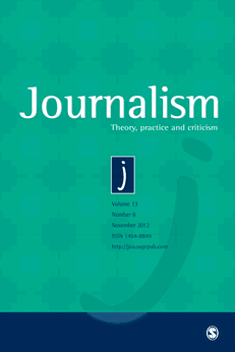
Journalism
Advancing the Discourse on Journalism's Role in a Changing WorldJournalism is a leading interdisciplinary journal published by SAGE Publications Inc, renowned for its rigorous academic standards and impactful research. With an ISSN of 1464-8849 and E-ISSN 1741-3001, the journal has established itself within the top quartile of both the Arts and Humanities and Communication fields, boasting an impressive rank of 22nd out of 552 in Arts and Humanities (miscellaneous) and 35th out of 511 in Social Sciences (Communication) as of 2023. This journal, based in the United Kingdom, is committed to fostering scholarly dialogue surrounding journalism’s evolving role in society, covering a wide range of topics including media ethics, digital communication, and the impact of state and global politics on public discourse. Notably, the journal does not offer open access, enhancing its exclusive appeal to academics and professionals. With a focused scope that extends from 2000 to 2024, Journalism contributes to the understanding of emerging trends and challenges, making it an invaluable resource for researchers, practitioners, and students alike seeking to engage deeply with contemporary issues in the field.

Media International Australia
Advancing Scholarly Dialogue in Media StudiesMedia International Australia is a leading journal that occupies a unique position at the intersection of communication and cultural studies. Published by SAGE Publications Ltd, this journal has established itself as a vital platform for scholarly discourse since its inception, now converging efforts from 2008 to 2024. With an impressive Q1 ranking in both the Communication and Cultural Studies categories, it ranks 12th out of 1304 in Cultural Studies and 42nd out of 511 in Communication, placing it within the 99th and 91st percentiles respectively according to Scopus metrics. The journal is committed to providing access to rigorous research that reflects contemporary issues in media, making it essential reading for researchers, professionals, and students keen on advancing their understanding of media's role in society. Despite not being fully Open Access, it ensures that quality research remains accessible through institutional subscriptions, allowing a broad audience to benefit from its insightful contributions.

Revista de Comunicacion-Peru
Connecting Scholars, Inspiring Change.Revista de Comunicación-Perú is a distinguished open-access journal published by Universidad de Piura, with a dedicated focus on communication studies. Since its inception in 2002, the journal has provided a vital platform for researchers, professionals, and students to disseminate knowledge and foster discourse in the field of communication. As of 2023, it proudly holds a Q1 classification in the Communication category and ranks impressively in Scopus, placing at #117 out of 1304 in Cultural Studies and #160 out of 511 in Communication, demonstrating its significant impact within the academic community. The journal’s scope encompasses diverse topics related to communication, cultural discourse, and media analysis, making it an essential resource for those seeking to explore contemporary issues in these areas. With a commitment to promoting scholarly exchange, Revista de Comunicación-Perú continues to play a pivotal role in shaping the communication landscape in Peru and beyond.

Revista Comunicacao Midiatica
Cultivating Knowledge in the Realm of CommunicationRevista Comunicação Midiática is a prominent academic journal focusing on the fields of communication, media studies, and cultural dynamics, published by Universidade Estadual Paulista Júlio Mesquita Filho, Facility of Architecture, Arts & Communication. With its ISSN 2236-8000, this journal aims to disseminate innovative research, theoretical advancements, and practical insights that contribute to a deeper understanding of communication processes in contemporary society. Although it currently does not provide Open Access options, the journal serves as a valuable resource for researchers, professionals, and students who are keen to explore the intricate relationships between media and culture. Located in Bauru, Brazil, the journal is committed to fostering multidisciplinary dialogue and enhancing scholarly discourse, making it an invaluable addition to the academic landscape in the realm of media studies.